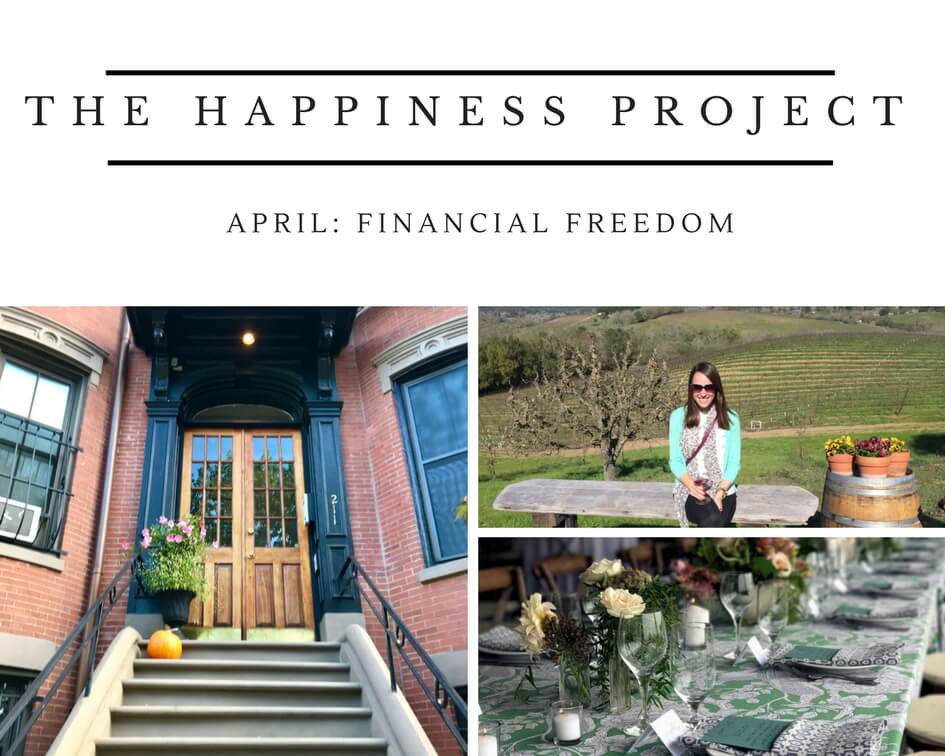I can’t believe we are already on month four of my happiness project – time is flying be here! If you’re new to South End Style, you can catch up by viewing my previous posts – month 1: vitality, month 2: marriage and month 3: attitude. To recap, I started this project when I stumbled across Oprah’s podcast and heard Gretchen’s review of her year long happiness project.

We all know that finances can be a huge cause of stress in life, marriage, families, etc. I knew from day one that this was a topic I would tackle at some point and it seemed appropriate as April is the midst of tax season. Plus, I think that every year, a financial “spring cleaning” is beneficial in so many ways. Throughout the year your financial situation changes. Whether you get married, you move, you get a new job, you buy a new car…there are countless factors that contribute to your finances and it is critical to have control over your finances, and not the other way around.
Part 1: Make a Plan
For our current situation, we needed to figure out how to combine finances after marriage and get on the same page when it comes to planning for our future. Look, there are probably a million different ways to approach finances as a married couple so I won’t touch on that. What’s right for me may not be right for you and vice versa. However, there are some basic finance fundamentals that I have learned that hold true to anyone looking to gain control of their money. Here is a basic plan that has worked for me over the years and is working for us as a married couple.
1. Have an emergency fund. If I learned one thing about the importance of building financial freedom. this is it. There is nothing more important than having an emergency fund. Let me repeat that – having an emergency fund is your #1 financial priority. This is your lifeline if something happens – you lose your jobs, your get in a bad accident, you have an unexpected large expense. Having this money stocked away (equivalent to minimum 6 months living expenses) allows you to avoid falling down the rabbit hole of credit card debt, should a catastrophe happen. Let’s plan for the worse here, people. This contribution can be made via lump sum or max monthly payment.
2. Max out your 401K – as much as you can, every month, ideally the absolute maximum allowed. I am fortunate that my employer matches up to a certain percentage, so I want to be especially sure that I maximize this and take advantage of that “free” money.
3. As my grandfather always said: “pay yourself first“. That means make sure you contribute to both a savings account for fun (trips, big ticket items, cushion money, etc.) and then a checking account for everyday stuff (rent, bills, car expenses, etc).
4. Lastly, invest! For some of us, this may come later rather than sooner and that is okay. Whether it’s your extra holiday / birthday money or an annual bonus, it is always wise to invest that money rather than frivolously spend it. A few options that my financial planner suggested are a Roth/Traditional IRA, a money market account or the stock market.
I find that once I build up #1, contribute to #2 and #3a, the leftover (what’s going to my checking account) is the amount that I truly have to live off of. It’s sometimes a tough pill to swallow, but I would rather live a bit below my means and have a little cushion versus living above my means and be worried about my finances every month. Practice does really make perfect and I have found it to be invaluable to be realistic with what we truly can and cannot afford.
The Verdict: Knowledge is power! Having “a plan” is empowering and it’s much easier to follow when written by a professional. Plus, for couples, it’s less about what you are missing out on and more about what you are saving towards together. I cannot suggest meeting with a certified financial planner enough!
Part 2: Change Daily Habits
It is important to know what you can afford, stay within budget and don’t spend money on stupid sh*t. I see SO many friends & colleagues overspending to “keep up with the Joneses”…ugh, it’s so hard to watch. There are so many ways to stay within budget without feeling left out. A few easy ways to remain social while keeping within budget are to host a potluck, schedule friend dates around free fitness classes or grab a bite out at breakfast or lunch instead of dinner.
I believe that budgeting is mainly a habit and a lifestyle. For example, when you go out to lunch everyday with your coworkers, it may only be a $10 salad but that adds up. ($50/week, $200/month, $2400/year). It’s the habit that you enjoy. Bring your lunches 4 times per week & go eat outside together. Every Friday treat yourself. You’ll end up saving almost $2k/year and probably won’t miss it!
Know your vice:
For my husband, it’s Starbucks and Uber…aka, convenience and laziness. We got him a Keurig for work and while the habit hasn’t completely halted, it’s been cut in half, which is a great improvement.
For me, it’s buying home décor items…aka, shopping. So I basically won’t allow myself to buy anything unless I (a) sell something I already own or (b) truly need it. Luckily, I’ve had a lot of design clients lately, so I find that buying items for them really curbs that desire to buy for myself.
The Verdict: Easier said than done. Changing habits is a daily practice and often requires baby steps. Pick 1 bad habit, work on it for 21 days and it will become a new, healthy habit.
Quotes + Articles Worth Reading
6 ways to spring clean your finances
3 ways to meet your financial goal
5 apps to help monitor your finances
How millennials can reach financial freedom
Happiness Habits Implemented
From January: power hour has become an abbreviated “power half hour” about twice a day where I spent 15 minutes in the am and 15 minutes in the pm doing sh*t around the house (laundry, pickup, making the bed, etc) and it keeps everything in order. That way my real “power hour” on Fridays can be spent on larger tasks and not around the house type stuff.
From February: trying hard to “not sweat the small stuff” – dishes not put in the sink, a forgotten event, working too late, etc. The small stuff will eat you alive and I’ve been working real hard to try and (a) ignore it or (b) laugh it off. Having a sense of humor about stuff that annoys me really works wonders – in the end, these little things just don’t matter so it’s better not to let them consume me.
From March: working on saying “yes” more and being more open. Definitely a work in progress, especially as our days get busier but so far so good.
Have you started your Happiness Project?!



[…] If you’re new to South End Style, you can catch up by viewing my previous posts – month 1: vitality, month 2: marriage, month 3: attitude and month 4: financial freedom. […]